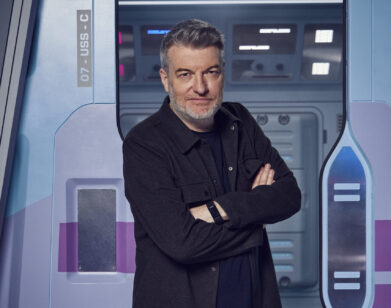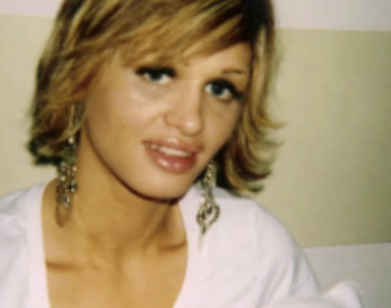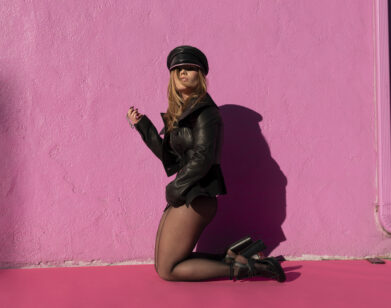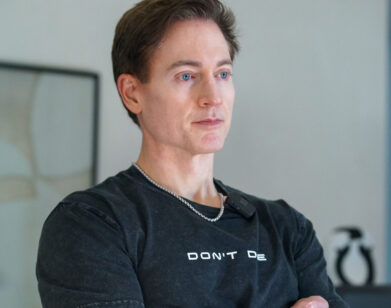Artist Rachel Mason on Growing Up in The Lap of Gay Porn Royalty
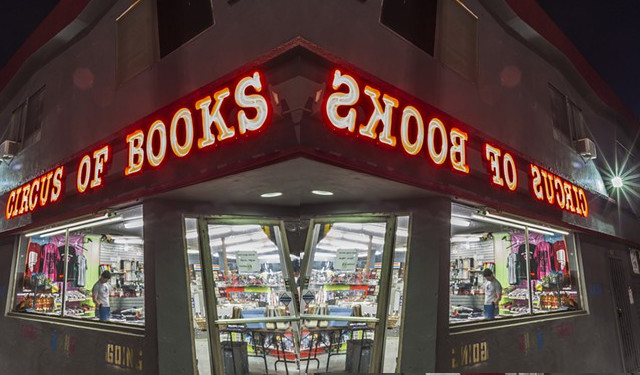
Courtesy Netflix.
“These are called cock rings,” a gray-haired and bespectacled Karen Mason tells her daughter, the renowned queer performance and visual artist Rachel Mason. Karen and her husband Barry are the devoutly religious, jaw-droppingly square subjects of a recently released Netflix documentary, Circus of Books, directed by their daughter. As the owners of the infamous West Hollywood haunt Circus of Books, Barry and Karen Mason became the largest producers and distributors of hardcore gay pornography in ‘80s and ’90s Los Angeles, all unbeknownst to their family and friends.
The artist and filmmaker Rachel Mason had no idea that her parents’ tumbledown West Hollywood shop was at the epicenter of the Los Angeles gay pornography scene until she was in high school. A friend, who had ventured into its infamous 18+ section, interrupted Mason’s teenage lament about her lame parents to inform her that Circus of Books housed an untold number of hardcore pornography videos and sex toys. “I always thought they were totally boring,” Mason laughs. “I rebelled against them constantly. Then I learned that my parents were the real rebels.”
As young parents in a financial pinch, the Masons placed an order for 2,500 pornographic magazines from a then little-known distributor named Larry Flynt, the publisher of Hustler. The success of this venture led them to pursue brick-and-mortar legitimacy in West Hollywood. Circus of Books sold hardcore gay pornography and toys at a time when such material was illegal; the couple even endured an FBI sting operation and an ensuing felony trial (all without their children suspecting a thing). Rachel and her brothers were allowed in the store as children, so long as they kept their eyes on the floor. “I just assumed every store had an over 18 section,” Rachel shrugs, “meanwhile, that section of the store was actually the entire operation.” In her youthful naïveté, she failed to realize that the time she spent chatting with the Circus clerks as she waited for her parents (Alaska Thunderfuck is a Circus alumnus), she was privy to an intimate glimpse of the coded realm of ‘80s and ‘90s gay culture: Circus of Books was a time-honored cruising spot, and of one of the most culturally loaded sites in Los Angeles’s gay history. The store has recently reopened to include a dedicated gallery space, which includes the nude polaroids of artist Jeremy Kost.
Mason’s film paints a clear-eyed portrait of her parents: their business acumen, their devout Judaism, their role as a bellwether for a vulnerable community under siege from AIDS and the police, even as they rejected their own son’s homosexuality. The documentary also functions as a tribute to the inhabitants of a bygone era, when a handkerchief in a trouser pocket was the safest way to signal one’s sexuality and illicit magazines could mean prison time. Despite the store’s cultural significance, the advent of online cruising and internet pornography killed business; the Masons were forced to close up shop last year despite the continued patronage of a few loyal customers, “On the very last day, a man wearing a Vietnam veterans cap and carrying a cane came in,” Mason recalls. “He just stood there and started crying. After the war, someone told him that if you’re gay in L.A., Circus of Books is a place you can go. He spent some of the best years of his life in that store, and he came to pay his respects.”
Despite the gravity of its content, the film is insistently joyful. Mason dutifully follows her mother around a sex toy convention in search of a wholesale lube supplier, and lovingly renders her parents’ dedication to the community they built. To find out what it’s like to grow up in the lap of gay porn royalty, we sat down with Mason to discuss cock rings, Stormy Daniels, and why some people treat Larry Flynt like Mother Teresa.
———
MARA VEITCH: This isn’t your first time in Interview.
RACHEL MASON: Right, the last time I was in Interview Magazine it was for my first project, a sort of art house film that I toured as performance art. It was this live karaoke project where I wrote around 20 songs and wove this whole weird story together. [Laughs] This couldn’t have been more different from that process. Putting this documentary together required more than just my own mind, I had to put a team together to teach my what the story really was. I had to play a role within the film that I didn’t really understand myself.
VEITCH: How did you think of that role at the time?
MASON: In a strange way, I was playing a version of myself. It was knowing that when my mom yells at me on camera, I just have to take it because it’s funny. I’d look back at the footage, footage from my real life, and say, “Okay, so that’s working.” But my role was also to play this cat and mouse game. The owner of a porn shop isn’t going to tell her daughter everything, so I’d have to get another producer to ask questions when I knew I couldn’t elicit the authentic response. My mom’s best lines happened when I wasn’t in the room, I would be around the corner listening like a little kid.
VEITCH: What did you think of your parents when you were a kid?
MASON: In our house, it was my mom’s way or the highway, and I couldn’t stand it. My mom was this devoutly religious moral authority, and the rest of us just did what she said.
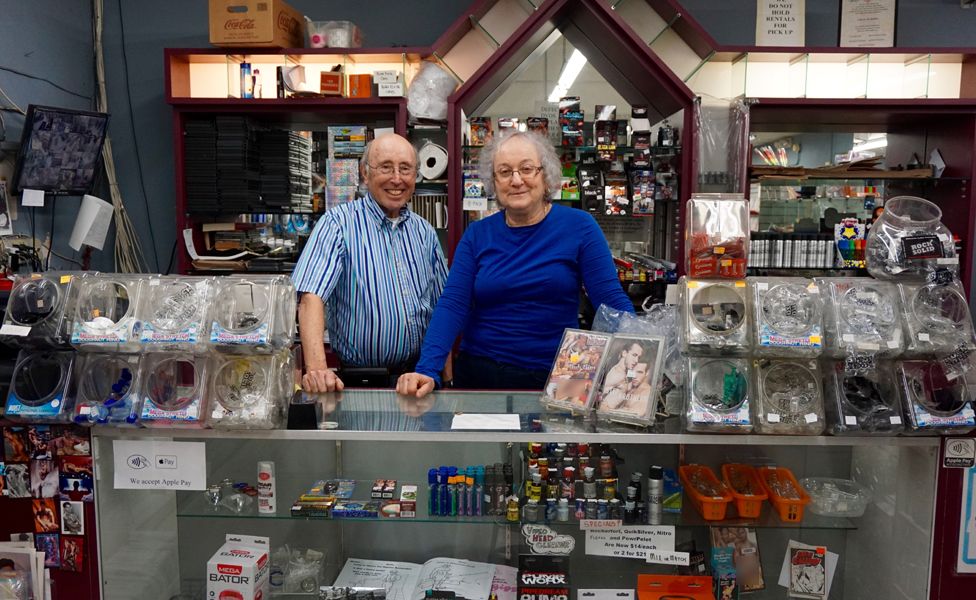
VEITCH: Can you tell me about the moment when you realized what your parents actually did for a living?
MASON: Growing up, we visited the store all the time. I thought it was normal that there were some places we weren’t allowed to go. It was actually my friends who were the first ones to be like, “You can’t believe what they have back there.” I had no idea. It wasn’t just porn and erotica, but they also had these creepy comic books, sex toys, and drug paraphernalia. In the ’90s, it was really crazy to have that kind of stuff.
VEITCH: Did your parents set rules for you about coming to the store?
MASON: We were told to just stay near the door and not to look around. We were allowed to talk to the clerks though, which I loved. They were mostly entertainers who were just doing the job for a while. Alaska Thunderfuck worked at Circus. I didn’t realize it then, but the store was my introduction to gay culture, and I fell in love with it through the clerks.
VEITCH: Circus of Books was a cultural hub for the gay community in Los Angeles. Did your parents ever come into contact with the less regulated, more dangerous side of the pornography industry?
MASON: I’ve been learning about this industry from the inside, through the documentary and from people like my own lover Buck Angel, who’s a trans porn actor, and I’m seeing that the industry is actually wrongly judged. It turns out that saying that the porn industry is exploitative is like saying that the restaurant industry is unsafe because food poisoning happens now and again. I had my own feelings about straight porn—I always thought that the gay side was pretty supportive, but that straight porn was insane. Now I’ve met a lot of women in straight porn who feel really empowered, because they run their own business. I mean, Stormy Daniels has a ranch in Iowa, she’ll do a movie now and then, she sets her rates, she likes sex. Sure, there are going to be horror stories, but it’s not a criminal enterprise by any stretch of imagination.
VEITCH: In recent years, as customers have largely stopped buying their porn on VHS or DVD, who were the people who continued to visit Circus of Books until it closed?
MASON: Well, for sure men. It was not an LGBT space. The culture of the store was really driven by this audacious desire to find sexual partners on the spot, and also to visualize sexual things. In the days before we closed, so many men—and I mean gosh, they were my parents’ age—came in to pay their respects. These were the customers who really showed the depth of what that store meant to people. It was there at a time when this community was suffering.
VEITCH: What was your parents’ relationship like with Larry Flynt, the publisher of Hustler?
MASON: My parents adored him. He was this First Amendment warrior. When he was shot, it was like he took a bullet for the entire industry. When I first told my mom I was interviewing him, she freaked out. It was like he was a god. She kept warning me not to disturb him. “He’ll barely remember us and he’s a genius.” After meeting him, I agreed. He’s a totally brilliant person who battled the same culture my parents did, but on a totally different scale. When you’re that visible, there’s just so much responsibility that’s foisted on you. I was just at the AVN [Adult Video News] Awards, and they did a heartbreaking tribute to him. You would’ve thought it was Mother Teresa, not Larry Flynt.

